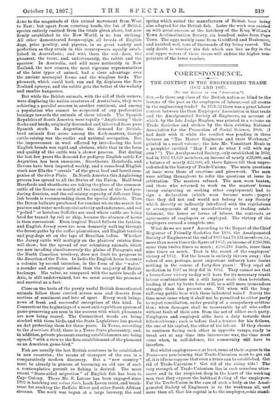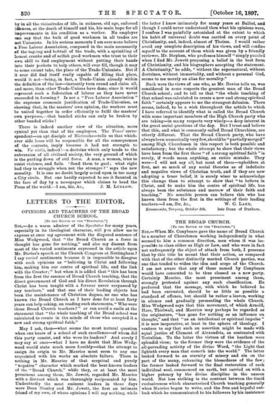CORRESPONDENCE.
THE CONTEST IN THE ENGINEERING TRADE (1852 AND 1897).
[To THE EDITOE OF THE "SPECTATOR.}
Sin,—Is there any class of the British nation so blind to the lessons of the past as the employers of labour,—at all events in the engineering trade ? In 1851-52 there was a great labour contest between the then Employers' Association in that trade and the Amalgamated Society of Engineers, an account of which, by the late Judge Hughes, was printed in a volume on Trade Societies and strikes by the then existing National Association for the Promotion of Social Science, 1860. (I had dealt with it while the conflict was pending in three lectures on "The Master Engineers and their Workmen," printed in a small volume ; the late Mr. Vansittart Neale in a pamphlet entitled "May I not do what I will with my own ? ") The Amalgamated Society, only established in 1850, had in 1852 11,829 members, an income of nearly £23,000, and a balance of nearly £22,000, all three figures till then unpre. cedented in the history of Trade-Unions. The main questions at issue were those of overtime and piecework. The men were willing throughout to refer the questions at issue to arbitration. The masters refused. The men were beaten, and those who returned to work on the masters' terms (many emigrating or seeking other employment) had to sign a declaration (which soon became waste - paper) that they did not and would not belong to any Society which directly or indirectly interfered with the regulations or arrangements of any manufacturing or trading estab- lishment, the hours or terms of labour, the contracts or agreements of employers or employed. The victory of the employers seemed a complete one.
What do we see now? According to the Report of the Chief Registrar of Friendly Societies for 1896, the Amalgamated Society of Engineers at the end of 1895 had 79,134 members, i.e., more than seven times the figure of 1852; an income of £296,960, more than twelve times as much ; £206,116 funds, more than nine times as much. That is the result of the employers' victory of 1852. Yet the lesson is entirely thrown away ; the rulers of our, perhaps, most important industry have learnt nothing in the course of forty-five years ! They repel all mediation in 1897 as they did in 1852. They cannot see that a brute-force victory to-day will have for its necessary result labour combinations on a still larger scale than heretofore, leading, if met by brute force still, to a still more tremendous struggle than the present one. Till when will the long- suffering public bear with these industrial wars ? Surely the time must come when it shall not be permitted to either party to reject conciliation, under penalty of a compulsory arbitra- tion; when damages shall be recoverable by all who suffer without fault of their own from the act of either such party. Employers and employed alike have a duty towards their fellow-citizens ; each is before God a trustee for his fellows, the one of his capital, the other of his labour. If they choose to continue facing each other in opposite camps, ready to break out at any time into internecine war, the time must come when, in self-defence, the community will have to interfere.
Bat whilst employers—or, at least, some of their organs in the Press—are proclaiming that Trade-Unionism must be got rid of, it is idle to suppose that even a truce can be established. Get rid of Trade-Unionism ? Get rid of the rising tide ! The very strength of Trade-Unionism lies in such senseless utter- ances and in the suspicion deep in the heart of the working man that they express the habitual feeling of the employers. For the Trade-Union in the case of such a body as the Amal- gamated Society of Engineers is to the workman all, and more than all, that his capital is to the employer,—his stand-
by in all the vicissitudes of life, in sickness, old age, enforced idleness, at the death of himself and his, his main hope for all improvements in his condition as a worker. No employer elan say that the bulk of good workmen in all trades are not Unionists. In his serious moments I am sure none believe a Free Labour Association, composed in the main necessarily of the tag-rag and bobtail of the trade, with a sprinkling of konest cranks and of selfish good workmen who trust to their own skill to find employment without putting their hands into their pockets to help others, will ever fill, though it may to some extent take, the place of the Trade-Unionists. But if it ever did find itself really capable of filling that place, would it not—being, in fact, a Trade-Union already within the definition of the law—instantly turn round and claim all, and more, than other Trade-Unions have done, since it would represent such a federation of labour as they have never succeeded in forming ? Is not a "Free Labour Association" the supreme economic justification of Trade-Unionism, as showing that, in the masters' own opinion, the workers must be united together in order efficiently to fulfil the masters' own purposes,—tbat banded sticks can only be broken by other banded sticks There is indeed another view of the situation, more cynical yet than that of the employers. The Times' corre- spondent—an apt disciple of Nietszche—tells us that which- ever side loses will be responsible for all the consequences of the contests, imply because it had not strength to win. Vw victis, indeed !—a doctrine which only tends to the subversion of all civilised society, the very ground of which is the putting down of evil force. A man, a woman, tries to resist violence, and fails. Send them to gaol ; what right had they to struggle when not the stronger ? ' says the new morality. It is one no doubt largely acted upon in too many a City circle. But one hardly expected to see it flaunted in the face of day by a newspaper which claims to head the Press of the world.—I am, Sir, &c., J. M. LUDLOW.







































 Previous page
Previous page